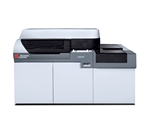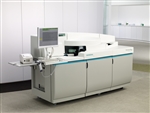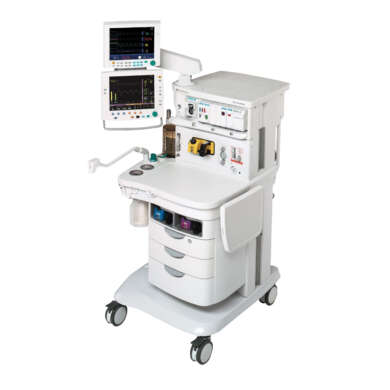Description
The newest member of the high-performance Beckman Coulter laboratory analyzer series is the AU680 Chemistry System. Based on in-depth customer consultation, the AU680 Chemistry System is intended to help medium to high throughput laboratories meet ever increasing pressures on time and productivity.
The benefits of the AU680 Chemistry System can be divided into three main categories – improved user convenience including automation options; extended analytical reach and reduced operating costs. Regarding convenience, the AU680 Chemistry System is operated through a new and highly intuitive graphical user interface, including embedded videos to support key maintenance steps. Flexibility is assured with a menu capacity of up to 63 different assays on board. A new special priority lane performs re-runs quickly. To increase automation levels, samples can be loaded via a new standardized rack tray for direct transfer from the Beckman Coulter AutoMate 2500 peri-analytical workstation.
Triple reagent dispensing enables the AU680 Chemistry System to perform assays requiring up to three separate reagents. This enhances analytical performance and opens up new possibilities for current and future assays. Overall, operating costs are reduced by eliminating the need for multiple calibrators via “Plug and Play” calibration using 2D barcodes.
Finally, the AU680 Chemistry System offers a speed of up to 1200 tests per hour and an on-board capacity of up to 63 different tests in parallel. Profit from innovative features and clear benefits for your lab!
Features:
Improved convenience
- New and intuitive graphical user interface
- Excellent overview and precise software guidance
- Embedded maintenance video
New analytical horizons
- Handling of 3-shot reagents
Plug and play calibration via 2D barcode
- Minimized reagent volumes
- Eliminates need for multiple calibrators
- Applies to C3, C4, Transferrin and ASO
Sample feeder
- Positive sample identification to eliminate any sample mix ups
- Beckman Coulter flexible racks to handle all commonly used tube sizes in parallel
- Barcoded racks to define different sample materials or other sample specifics
- 150 samples on board at any time for long walk away
- Reflex testing
- Priority re-run lane
Refrigerated reagent compartments
- Real workstation consolidation with up to 60 different analytes in parallel
- Ready to use liquid stable reagents
- Automatic bottle switch capabilities
- Advanced calibration
- Liquid detection and remaining test number calculation
Washing station
- High tech wash station to ensure a valid diagnostics
- Two different detergents to prevent any carry over
- Four fold water cleaning followed by a separate drying step to gain optimum system performance
Mixer
- High precision mixer station to ensure excellent reaction conditions
- Standardized mixing procedures across the whole range of analyzers
- Different mixer positions for individual reaction steps
Cuvettes wheel
- Non disposable quartz cuvettes
- Software driven carry over elimination
- Total reaction volume as small as 120 µl
- Environmental friendly
ISE unit
- High quality ISE for Na, K and Cl
- 6 months shelf life
- 18 months shelf life for reference electrodes
- 600 tests/hour (if ISE mode only)
- Same technology across the whole range of analyzers
Sample probe
- Sample volume as small as 1.6 µl
- Clot detection
- Crash prevention
- Sampling frequency of 4.5 seconds
STAT sample rotor
- Dedicated STAT rotor with 22 positions and integrated barcode reader
- Full STAT capabilities during routine operation
- Refrigerated area for calibrators and controls
- Combined routine and emergency work area
Reagent probes
- Tact frequency 4.5 seconds
- Reagent volume as small as 15 µl
- Liquid detection
- Calculation of remaining tests/vial
Specifications:
| Analytical system |
Fully automated, random access chemistry system with STAT capability |
| Analytical principle |
Spectrophotometry and potentiometry |
| Analytical types |
Endpoint, rate, fixed point and indirect ISE |
| Analytical methods |
Colorimetry, turbidimetry, latex agglutination, homogeneous EIA, indirect ISE |
| Simultaneously processed analytes |
60 photometric tests + 3 ISE |
| Throughput |
800 photometric tests/hour; up to 1,200 with ISE |
| Sample types |
Serum, urine, whole blood (HbA1c), other 1, other 2 |
| Sample feeder |
Racks with 10 samples each (bar codes on primary tubes and on racks); capacity of 150 samples; continuous loading |
| Sample tubes |
In primary and secondary tubes; diameter between 11.5 and 16.5 mm; height between 55 and 102 mm |
| STAT samples |
Up to 22 positions for STAT samples, bar-coded primary tubes |
| Sample volume |
1–25 μL in 0.1 μL increments (1–25 μL for repeats) |
| Reagent supply |
60 positions for R1, 48 positions for R2; (refrigerated 4–12 °C), handling of 3-shot reagents |
| Reagent volume |
R1: 15–250 μL; R2: 15–250 μL; (in 1 μL increments) |
| Total reaction volume |
120–425 μL |
| Reaction cuvette |
Quartz cuvettes |
| Reaction time |
Up to 8 minutes, 40 seconds |
| Reaction temperature |
37 °C |
| Mixing method |
With rotating paddles after dispensing sample and reagent |
| Photometry system |
Direct assay through the reaction cuvette (0 – 3.0 OD) mono and bichromatic measurements possible |
| Wavelength |
13 different wavelengths between 340 – 800 nm |
| Cuvette cleaning |
Comprehensive cleaning with detergents |
| Calibration |
Autocalibration, cooled calibrator positions; master calibration established by two-dimensional bar code of the reagent bottle (>3-point calibration) |
| Quality control |
Auto QC, cooled QC positions |
| Test requisition |
Individual and profile test requisition via on line, mouse, functions keys or touch screen |
| Safety |
Clot detection and crash prevention for sample and reagent dispenser |
| Online |
Full uni- and bidirectional communication possible |
| Software |
Windows XP® |
| Data Storage |
Sample number 100,000 samples. Reaction Data 200,000 tests |
| Dimensions (W x H x D) mm |
ANL 1,950 x 1,280 x 1,000 |
| Power supply |
200 V; 208 V; 220 V; 230 V; 240 V; 50 Hz; 60 Hz/3.8 KVA |




Reviews
There are no reviews yet.